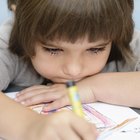
E. Dygas/Photodisc/Getty Images
The way that mothers and fathers bond with their children is an important consideration in an era when both parents aren't always available. Growing up with just one parent has become a common experience. According to the 2016 US Census, more than a quarter of American kids live in single-parent households. Children are affected differently by bonds formed with their mother versus bonds formed with their father. Research over the past 30 years has identified unique benefits that bonding with each parent can have for children.
Bonding and Attachment
Bonding refers to the feelings of safety and trust that children form with parents and other significant people in their lives. It is often referred to as "attachment," and it is central to understanding how human beings grow and develop emotionally, mentally and socially. Your sensitive and appropriate response to your child's needs is thought to be the foundation of your child's personality and relationships with others.
Mother and Child Bonding
Research on bonding began in the 1960s, an era when mothers were seen as the primary caregivers. In fact, the earliest research on attachment focused exclusively on mothers. The goal in studying mother-bonding was to learn how it affected an infant's feelings of safety with others and confidence in exploring the world. In studies done in child-development labs, researchers found that the more secure the bond with the mother, the greater the feelings of safety and confidence. Recent research has looked at how mother and child bonding affects children's self-reliance, social competence, emotional stability and ability to nurture relationships with others.
Paternal Bonds
Fathers feel responsible to nurture children with financial support, child care and limit-setting. Though mothers also provide income, research suggests that a child's economic well-being is most often dependent on the income of father. Fathers have become more involved with care taking and setting limits for children as women have assumed more financial responsibilities.
Benefits of Mother and Child Bonding
A strong maternal bond helps children become more confident and competent at school. Children who are securely bonded to their mothers are more likely to be self-starters and require less prompting from their teachers. Secure bonds with mom allow children to cope more easily with change and have better social skills with peers. Researchers have found that children with secure mother-bonds demonstrate a better understanding of other children's emotions.
Benefits of Father and Child Bonding
Since father-bonding is tied to providing for children financially, that economic support is central to preventing childhood poverty and providing resources for kids to become academically and socially successful. It also enables kids to access community resources to grow their talents and expand their opportunities. The way fathers provide care and communicate feelings helps kids feel more satisfaction in life, and appropriate limit-setting contributes to academic success, fewer problems with delinquency and more social competence.
Related Articles

Types of Mother-Daughter Relationships

How Does an Overbearing Mother Affect a ...

Facts About Orphans

The Effects of an Absent Mother Figure

How Does a Bad Childhood Affect ...

The Emotional Effects on the Father ...

Importance of Father & Son Relationships

Positive and Negative Aspects of ...

How Can I Help My 11 Year Old Daughter ...

How Absent Fathers Affect Men

Effects of Divorce on Children in ...

Importance of the Brother Sister Bond

The Effect on Men That Grow Up Without ...

Advantages of a Blended Family

Psychological Effects of Fatherlessness

Parental Rejection in Adulthood

Traumatic Effects of a Bad Marriage on ...

Teens Dealing With Jealous Boyfriends

Effects on Girls Raised by Single ...

Early Childhood Social Skills Needed to ...
References
- US Census: America’s Families and Living Arrangements
- Developmental Psychology: The Origins of Attachment Theory
- Attachment and Human Development: Attachment and Development - A Prospective, Longitudinal Study from Birth to Adulthood
- Attachment from Infancy to Adulthood: The Major Longitudinal Studies: Understanding and Resolving Emotional Conflict - The London Parent-Child Project
- Fathering: New Father's Experiences with Their Own Fathers and Attitudes Toward Fathering
- Journal of Marriage and Family: Scholarship on Fatherhood in the 1990s and Beyond
- US Census: The Majority of Children Live With Two Parents, Census Bureau Reports
Writer Bio
Katrina Miller is a medical writer specializing in behavioral health. She has been published in "Family Perspectives" and the "Salt Lake Tribune." She has a doctoral degree in Family and Human Development from Utah State University.
Photo Credits
E. Dygas/Photodisc/Getty Images